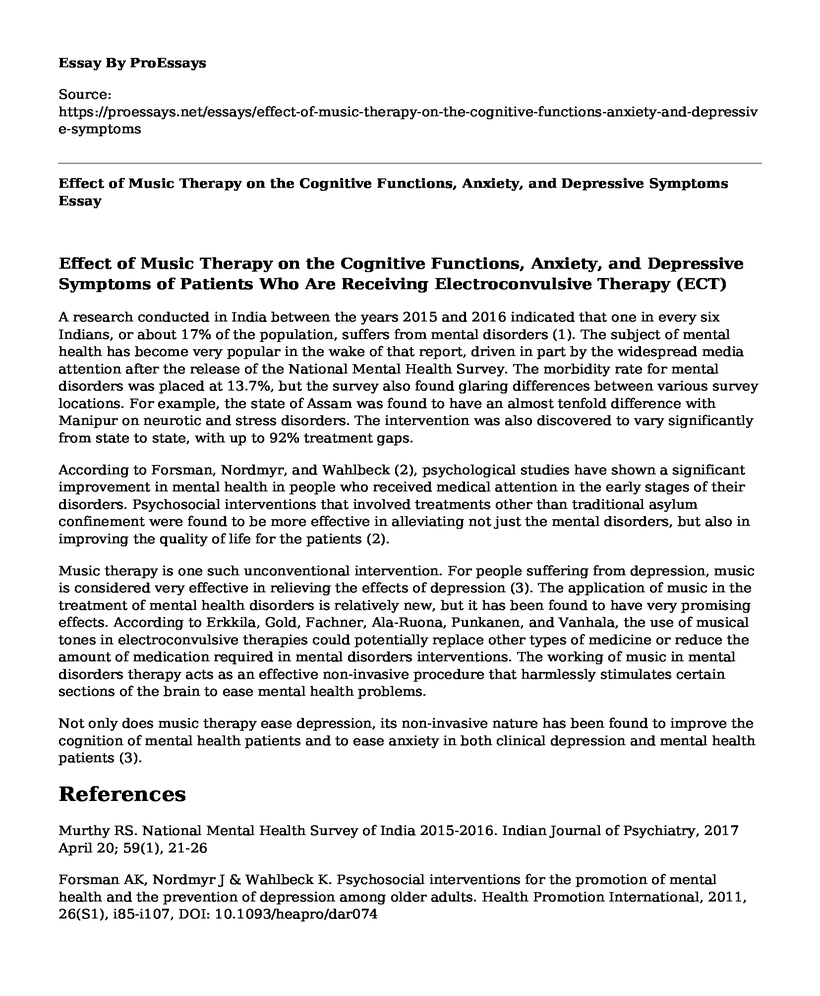Effect of Music Therapy on the Cognitive Functions, Anxiety, and Depressive Symptoms of Patients Who Are Receiving Electroconvulsive Therapy (ECT)
A research conducted in India between the years 2015 and 2016 indicated that one in every six Indians, or about 17% of the population, suffers from mental disorders (1). The subject of mental health has become very popular in the wake of that report, driven in part by the widespread media attention after the release of the National Mental Health Survey. The morbidity rate for mental disorders was placed at 13.7%, but the survey also found glaring differences between various survey locations. For example, the state of Assam was found to have an almost tenfold difference with Manipur on neurotic and stress disorders. The intervention was also discovered to vary significantly from state to state, with up to 92% treatment gaps.
According to Forsman, Nordmyr, and Wahlbeck (2), psychological studies have shown a significant improvement in mental health in people who received medical attention in the early stages of their disorders. Psychosocial interventions that involved treatments other than traditional asylum confinement were found to be more effective in alleviating not just the mental disorders, but also in improving the quality of life for the patients (2).
Music therapy is one such unconventional intervention. For people suffering from depression, music is considered very effective in relieving the effects of depression (3). The application of music in the treatment of mental health disorders is relatively new, but it has been found to have very promising effects. According to Erkkila, Gold, Fachner, Ala-Ruona, Punkanen, and Vanhala, the use of musical tones in electroconvulsive therapies could potentially replace other types of medicine or reduce the amount of medication required in mental disorders interventions. The working of music in mental disorders therapy acts as an effective non-invasive procedure that harmlessly stimulates certain sections of the brain to ease mental health problems.
Not only does music therapy ease depression, its non-invasive nature has been found to improve the cognition of mental health patients and to ease anxiety in both clinical depression and mental health patients (3).
References
Murthy RS. National Mental Health Survey of India 2015-2016. Indian Journal of Psychiatry, 2017 April 20; 59(1), 21-26
Forsman AK, Nordmyr J & Wahlbeck K. Psychosocial interventions for the promotion of mental health and the prevention of depression among older adults. Health Promotion International, 2011, 26(S1), i85-i107, DOI: 10.1093/heapro/dar074
Erkkila J, Gold C, Fachner J, Ala-Ruona E, Punkanen M & Vanhala M. The effect of improvisational music therapy on the treatment of depression: protocol for a randomised controlled trial. Biomed Central Psychiatry, 2008 June 28; 8(50), 1-9, DOI:10.1186/1471-244X-8-50
Cite this page
Effect of Music Therapy on the Cognitive Functions, Anxiety, and Depressive Symptoms. (2022, May 17). Retrieved from https://proessays.net/essays/effect-of-music-therapy-on-the-cognitive-functions-anxiety-and-depressive-symptoms
If you are the original author of this essay and no longer wish to have it published on the ProEssays website, please click below to request its removal:
- Poverty, Money, and Politics in the United States
- Psychology Course Work Example: Trauma and Crisis Intervention
- The Disposition by Michelangelo - Critical Essay
- Film Analysis Essay on "Cannibal Tours" by Dennis O'Rourke
- Essay Example on Family Connections Theory: Interdependence and Emotional Strength
- Essay on Thinking in Pictures by Temple Grandin: A Detailed Analysis of Autistic Life
- Jenny's PTSD, Baby's Cleft Lip: Impact on Mental Health of New Mother - Essay Sample







